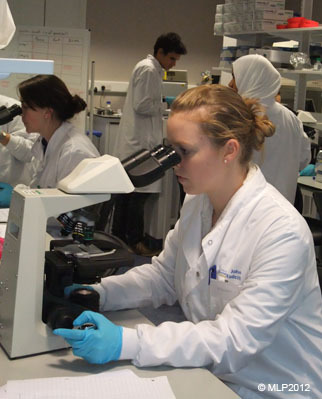- fr Change Region
- Global Site
Nouvelles
Oxford MSc in Clinical Embryology continues to attract global attention
juill. 17, 2012
The Oxford MSc in Clinical Embryology is a one-year residential programme in the field of assisted human reproduction run by the Nuffield Department of Obstetrics and Gynaecology, University of Oxford. Based alongside the Oxford Fertility Unit in the new Institute for Reproductive Sciences in Oxford, this comprehensive postgraduate course features teaching input from a wide range of internationally-acclaimed scientists and clinicians, access to state-of-the-art laboratory facilities, and close collaboration with the Oxford Fertility Unit. The third cohort of students completed the course in September 2011. The Nikon Prize, an annual award made to the student who shows the most improved gamete micromanipulation skills, based upon experience and skill base prior to joining the course, was awarded to Christodoulos Christodoulou, a science graduate from Cyprus. Judged by Caroline Ross and Tracey Griffiths, both Senior Embryologists in the Oxford Fertility Unit, the prize (a state-of-the art Nikon SLR digital camera) was presented by Professor Sir Richard Gardner at a closing session presented by the Course Director, Dr Kevin Coward.
Developed in response to phenomenal growth in this sector, the course is now in its fourth successful year and continues to attract attention from all over the globe. The current class is made up of doctors, clinical embryologists and basic scientists from ten countries including Bahrain, South Africa, Russia, Iran, and Azerbaijan. The course teaching staff ensure that the curriculum adapts and develops each academic year in line with student feedback, legislative changes, and scientific/clinical advancement. It also now features an advanced microscopy workshop, delivered by Nikon UK, in which students are given first-hand experience of confocal microscopy, and a laboratory session dedicated to the quantitative assessment of DNA fragmentation in human sperm.
Dr Coward noted that “Ever since the course was conceived, our remit has always being to inspire, motivate, and nurture future leaders in reproductive medicine. We strongly believe that the course is successfully achieving these aims. We are very proud of our graduates and continue to support them in every way we can.” In total, the Oxford MSc now boasts 29 graduates from a total of 24 countries around the world. Graduates have been very successful in achieving their career goals. In a recent survey, 43% of respondent graduates were employed as embryologists, 30% had registered for a PhD degree, 17% were either training or working in medicine, and the remainder were employed as researchers in the reproductive sciences. Sze Tian Tee and Anita Kuo, both clinical embryologists prior to joining the course, are now in charge of their respective IVF laboratories in Malaysia and Hong Kong. Graduates are distributed all over the world, including the UK, USA, Belgium, Singapore, Hong Kong, Malaysia, Egypt, and Australia.

A growing strength of the Oxford MSc is that students are encouraged to communicate their work to a wider audience. For example, students have contributed to published articles on clinical embryology training in the UK (co-authored by Joie Guner; published inBiologist), and the use of microscopy in assisted reproduction (co-authored by Sourima Biswas Shivhare and Ioannis Ladas; published inMicroscopy & Analysis). Several laboratory research projects carried out by MSc students have also yielded publications in peer-reviewed journals, includingNature Communications,Human Reproduction,Reproductive Biomedicine OnlineandPLoS ONE. Similarly, laboratory project work has been presented at major scientific conferences in Germany, Rome, and Ireland. Later this year, the course will boast its own textbook, TheTextbook of Clinical Embryology, published by Cambridge University Press and edited by Drs Kevin Coward and Dagan Wells, consisting of over 30 chapters written predominantly by clinicians and scientists who contribute to the MSc course curriculum.
The innovative teaching styles deployed on the course have been recognised recently by the Higher Education Academy (UK), an organisation which champions excellence in learning and teaching in higher education. Members of the core teaching staff (Dr Coward, Mrs Celine Jones and Dr Junaid Kashir) were recently awarded an HEA Teaching Grant to help develop novel methods for teaching practical laboratory skills. Dr Coward observed, “We are delighted that our enthusiasm and originality have been recognised by the HEA. We are constantly improving and developing our approach to teaching. With HEA support, we hope to create a new model for ‘hands-on’ laboratory teaching that will furnish our students with a suite of key practical skills in a highly original manner.” The new model will be deployed with the new cohort of students set to join the course in October 2012.
Top image: Mr Christodoulos Christodoulou, winner of the Nikon Prize 2011, being presented with a Nikon digital D5100 SLR camera by Professor Sir Richard Gardner.
